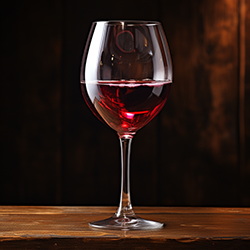Red Wine Headaches: Not Sulfites but Quercetin?
Posted by Matteo Lahm on 26th Nov 2023
This week, The Guardian, New York Times, and New York Post have all been yammering about a new study that might finally explain why that bottle of red you love so much sometimes leaves you clutching your temples. Previous blog posts have postulated about the dreaded red wine headache but now, some new research is shedding more light on this elusive foe. Public opinion often blames sulfites but these findings further support they are not the cause. Other research has looked towards fusel alcohol and amines but the jury is still out on those as well. These new findings suggest that quercetin glucuronide (which you’ve probably never heard of) has been the sneaky wall flower wielding the hammer inside your skull after a glass of the silky red.

Remember our old pal Celsus, the Greek philosopher who thought wine could cure everything from a bad mood to a bad case of the runs? Well, he also noted that our beloved grape nectar could occasionally cause a headache way back in the second century. Yes, that is how long people have been pondering this and now, thanks to some brainy researchers, we might finally be closer to solving this mystery.
The eggheads at the University of California, San Francisco, led by one Morris Levin, have been elbow-deep in this ancient puzzle. They've discovered that when your liver breaks down a certain ingredient in red wine, it produces a substance that's a dead ringer for a drug that makes alcoholics feel like they've been hit by a bus if they drink. Talk about a buzzkill!
Now, let's get one thing straight. These aren't your garden-variety hangover headaches. These red wine headaches are their own special brand of misery. They can ambush you just 30 minutes after you've had a glass or two. No marathon drinking session required.
Over the years, scientists have been playing the blame game with various compounds in red wine - tannins, sulfites, phenolic flavonoids, and biogenic amines. But none have been definitively fingered as the headache-inducing bad guy. Until now, that is.
The researchers have been eyeballing phenolic flavonoids, compounds that come from grape seeds and skin and give red wine its color, taste, and texture. Red wines have up to 10 times more flavonoids than whites, making them prime suspects for causing those instant headaches.
Here's the kicker. When you drink wine, the alcohol is metabolized to acetate in two steps. First, ethanol is converted to acetaldehyde. Then, acetaldehyde is turned into acetate. Your liver has specific enzymes for each of these steps.

The researchers ran lab tests on more than a dozen compounds in red wine. One stood out: a flavanol called quercetin. This compound, found almost exclusively in red wine, is processed in the body into various substances. One of these, quercetin glucuronide, is a real champ at blocking the enzyme that converts acetaldehyde into acetate.
When this enzyme is blocked, toxic acetaldehyde builds up in your bloodstream, causing headaches, nausea, facial flushing, and sweating. Sound familiar? It's the same miserable symptoms caused by a drug called disulfiram, used to treat alcoholics.
According to the researchers, when people who are susceptible drink red wine with even a smidge of quercetin, they can develop a headache, especially if they're prone to migraines. Why some people are more affected than others is still a mystery. Maybe their enzymes are easier to block, or perhaps they're just more susceptible to toxic acetaldehyde. That would explain why not everyone gets a headache.
The team now plans to test their theory with a clinical trial on the headache-inducing effects of red wines with different quercetin levels. The results could help you avoid red wine headaches in the future. Grapes make quercetin in response to sunlight, so grapes grown in exposed clusters, like Napa Valley cabernets, can have five times more quercetin than other reds. This supports why not all red wines get your head throbbing.
"It will be potentially very helpful for people who drink red wine to be able to choose wines less likely to cause headaches," Levin said. "Also, winemakers may use our findings to reduce quercetin in their wines."
So, next time you're nursing a red wine headache, don't blame your hangover or your inability to stop at just one glass. It just might be time to blame quercetin.
And just to set the record straight, previous blog posts on labelpeelers.com have asserted that sulfites are not the culprit of the infamous red wine headache. This research supports those arguments though amines are still on the table as a culprit or at least a co-culprit. Regardless, this is another piece of an age-old puzzle that further supports that you can fearlessly use sulfites to age your wine without worry that you will need some Tylenol after your first glass. Cheers!

